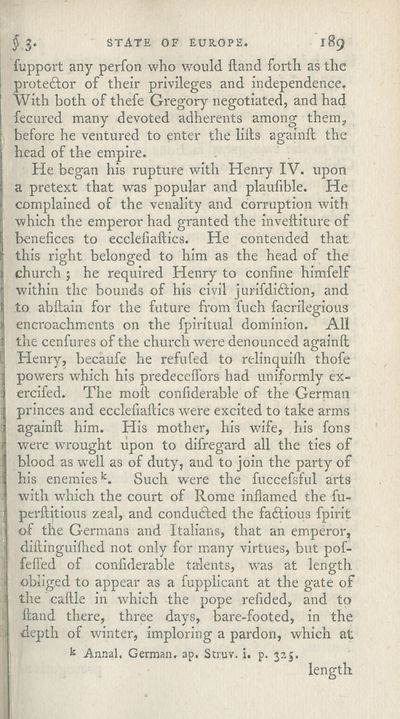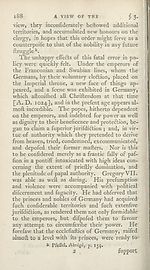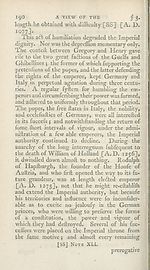Download files
Complete book:
Individual page:
Thumbnail gallery: Grid view | List view

§ 3- STATE OF EUROPE. 189
fupport any perfon who would Hand forth as the
protestor of their privileges and independence.
With both of thefe Gregory negotiated, and had
fecured many devoted adherents among them,
before he ventured to enter the liils againft the
head of the empire.
He began his rupture with Henry IV. upon
a pretext that was popular and plaufible. He
complained of the venality and corruption with
which the emperor had granted the inveftiture of
benefices to ecclefiaftics. He contended that
this right belonged to him as the head of the
church ; he required Henry to confine himfelf
within the bounds of his civil jurifdiftion, and
to abftain for the future from fuch facrilegious
encroachments on the fpiritual dominion. All
the cenfures of the church were denounced againft
Henry, becaufe he refufed to relinquifti thofe
powers which his predeceffors had uniformly ex-
ercifed. The moil confiderable of the German
princes and ecclefiaftics were excited to take arms
againft him. His mother, his wife, his fons
were wrrought upon to difregard all the ties of
blood as well as of duty, and to join the party of
his enemiesk. Such were the fuccefsful arts
with which the court of Rome inflamed the fu-
perftitious zeal, and condutfted the faftious fpirit
of the Germans and Italians, that an emperor,
diftinguiftied not only for many virtues, but pof-
1 fefled of confiderable talents, was at length
obliged to appear as a fupplicant at the gate of
I the caftle in which the pope refided, and to
I: ftand there, three days, bare-footed, in the
j depth of wdnter, imploring a pardon, which at
k Annal. German, ap. Struv. i. p. 325.
length
fupport any perfon who would Hand forth as the
protestor of their privileges and independence.
With both of thefe Gregory negotiated, and had
fecured many devoted adherents among them,
before he ventured to enter the liils againft the
head of the empire.
He began his rupture with Henry IV. upon
a pretext that was popular and plaufible. He
complained of the venality and corruption with
which the emperor had granted the inveftiture of
benefices to ecclefiaftics. He contended that
this right belonged to him as the head of the
church ; he required Henry to confine himfelf
within the bounds of his civil jurifdiftion, and
to abftain for the future from fuch facrilegious
encroachments on the fpiritual dominion. All
the cenfures of the church were denounced againft
Henry, becaufe he refufed to relinquifti thofe
powers which his predeceffors had uniformly ex-
ercifed. The moil confiderable of the German
princes and ecclefiaftics were excited to take arms
againft him. His mother, his wife, his fons
were wrrought upon to difregard all the ties of
blood as well as of duty, and to join the party of
his enemiesk. Such were the fuccefsful arts
with which the court of Rome inflamed the fu-
perftitious zeal, and condutfted the faftious fpirit
of the Germans and Italians, that an emperor,
diftinguiftied not only for many virtues, but pof-
1 fefled of confiderable talents, was at length
obliged to appear as a fupplicant at the gate of
I the caftle in which the pope refided, and to
I: ftand there, three days, bare-footed, in the
j depth of wdnter, imploring a pardon, which at
k Annal. German, ap. Struv. i. p. 325.
length
Set display mode to:
![]() Universal Viewer |
Universal Viewer | ![]() Mirador |
Large image | Transcription
Mirador |
Large image | Transcription
| Antiquarian books of Scotland > Kings & rulers > History of the reign of the Emperor Charles V. > Volume 1 > (207) |
|---|
| Permanent URL | https://digital.nls.uk/109184815 |
|---|
| Description | By William Robertson. London : Cadell and Davies, 1798. |
|---|---|
| Shelfmark | ABS.1.76.13 |
| Additional NLS resources: | |
| Description | Thousands of printed books from the Antiquarian Books of Scotland collection which dates from 1641 to the 1980s. The collection consists of 14,800 books which were published in Scotland or have a Scottish connection, e.g. through the author, printer or owner. Subjects covered include sport, education, diseases, adventure, occupations, Jacobites, politics and religion. Among the 29 languages represented are English, Gaelic, Italian, French, Russian and Swedish. |
|---|

